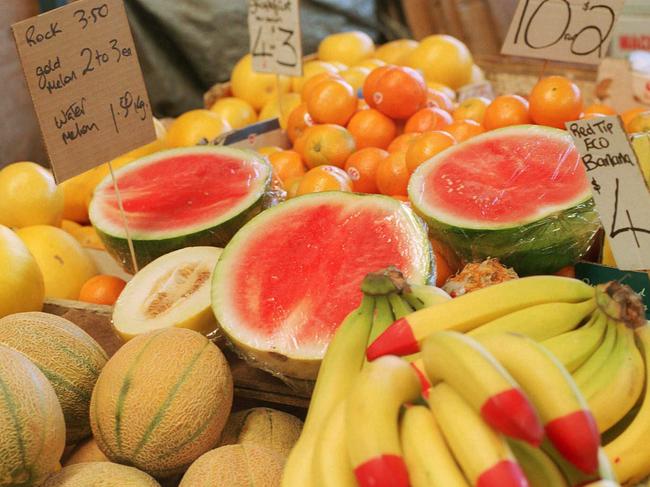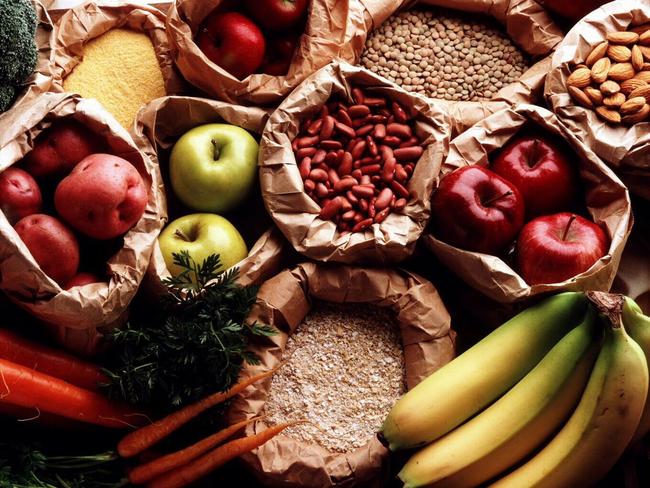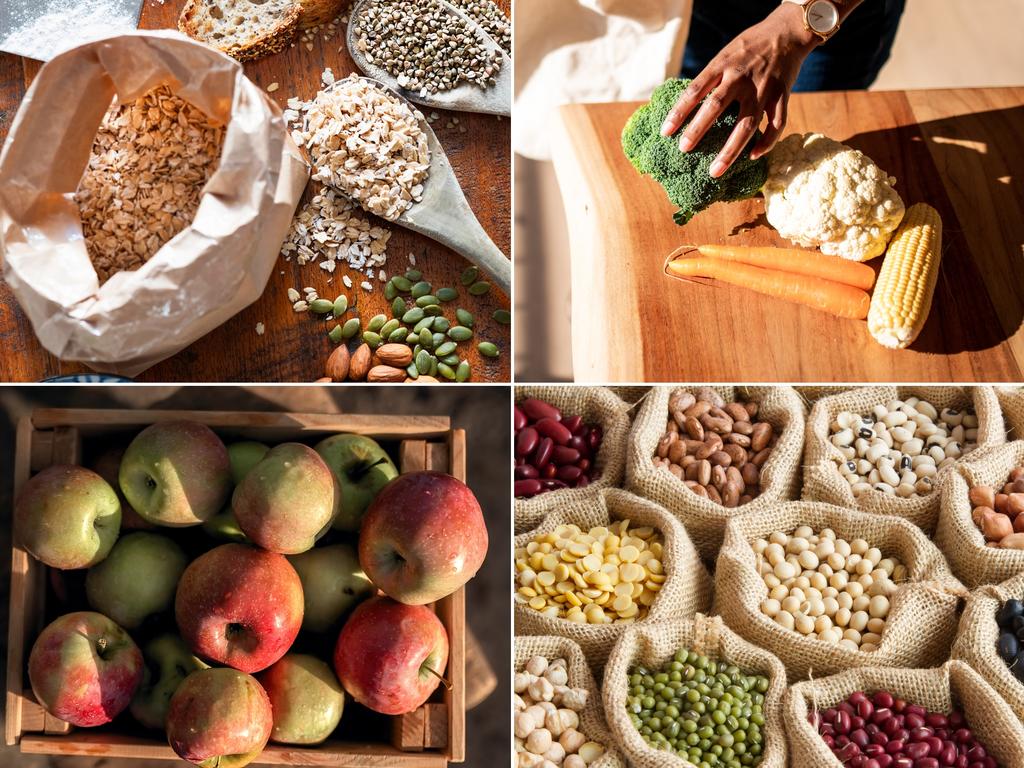What to eat to be one of the healthy elite at 70
Only one in 10 of us is in good shape at 70. A new study shows how our diet affects that.

Eating well in midlife could affect how healthy you are in your 70s. A study published this week (see news story below) outlined the dietary habits that will help adults to reach older age without chronic disease. Forget fancy supplements, superfoods and fasting, say the team from the Harvard TH Chan School of Public Health, University of Copenhagen and University of Montreal, the way to stay healthy and join an “elite” band of agers is simple: eat more of the good stuff and less of the bad.
More than 105,000 people aged 39 to 69 took part in the study, in which their self-reported diet patterns were analysed every four years between 1986 and 2010 and again in 2016. Participants were asked specifically how often they ate foods from a list of more than 130 items, with researchers then evaluating how closely their diet adhered to one of eight healthy eating plans including the Mediterranean diet, rich in olive oil, fish and nuts; the Alternative Healthy Eating Index (AHEI), containing wholegrains, nuts and beans and designed by Harvard nutrition experts to reduce chronic disease; the Planetary Health Diet Index (PHDI), which emphasises plant-based foods; and the Mediterranean-DASH Intervention for Neurodegenerative Delay (MIND) diet, which focuses on berries, beans and healthy fats.
“All of the healthy diet protocols looked at in this study are based on whole, nutrient-dense foods, plant-biased but not exclusively plant-based, and contain mostly moderate amounts of lean animal protein,” says Dr Linia Patel, a researcher in the department of clinical sciences and community health at the Universitaa degli Studi di Milano in Italy and a spokesman for the British Dietetic Association.

Three decades after the study began, those taking part were measured for markers of healthy ageing, defined as living to their 70th birthday without a chronic condition or impairment such as cancer, type 2 diabetes, stroke, multiple sclerosis and Parkinson’s disease. Typically, fewer than one in 10 people reaches this milestone in rude physical, mental or cognitive health. The results, published in Nature Medicine, found that 9771 of the study participants, or 9.3 per cent, aged healthily by the time they turned 70. Those sticking to any one of the healthy diet patterns consumed relatively more fruits, vegetables, wholegrains, nuts and pulses and so fared much better than those with higher intakes of ultra-processed foods, salt and sugar, who had a 32 per cent lower chance of healthy ageing.
Of the eight approaches assessed, the healthiest diet was the AHEI, which entails eating at least one serving of fish a week and at least five servings of vegetables, four of fruit, five to six of wholegrains and one of nuts or pulses every day. Those most closely matching the AHEI approach were found to be at an 86 per cent greater likelihood of healthy ageing, and at a 2.2 times greater chance of being healthy at 75 years compared with those with diets high in processed foods.
A diet free of animal-based foods had the weakest association with healthy ageing, but was still better than diets high in salt, sugar and saturated fats. Lean animal protein – such as fish and poultry – and dairy were consumed by some, although not all, of the elite eaters.
Here are the foods the study showed we should (and should not) be eating regularly to age well:
GET AT LEAST FIVE A DAY OF FRUIT AND VEG

If you are not getting the five a day of fruit and veg recommended by the UK government – and according to the BDA most adults get only four daily portions – that is a starting point. But if you are, you can raise the bar even higher. Guidelines for the AHEI approach suggest pitching for five servings of vegetables a day, with an extra focus on green leafy vegetables and less focus on potatoes and starchy veg. On top of that it suggests consuming four servings of fruit a day, “an amount that might help protect against cardiovascular disease and some cancers”, with berries, apples and pears all on the target menu. Fruit juice should be limited because it lacks the beneficial fibre found in the whole fruit.
EAT UP TO SIX SERVINGS OF WHOLEGRAINS A DAY
The five to six daily servings of fibre-rich wholegrains recommended in the AHEI diet sounds a lot. However, this can include: oats, which are rich in beta-glucan, a soluble fibre that has been shown to lower blood cholesterol levels; quinoa, which is a source of quercetin and kaempferol, powerful antioxidants that have anti-inflammatory and antiviral properties; and rye, a good source of B vitamins and rich in lignans, a type of polyphenol compound that has immune-supporting benefits. Other wholegrains include brown and wild rice, barley, buckwheat and “ancient grains” such as freekeh.
CONSUME A TABLESPOON OF OLIVE OIL A DAY
All the healthy eating plans in the latest study favoured olive oil and plant oils over saturated animal fats. Patel says that prioritising unsaturated fats such as plant oils can help to improve blood cholesterol levels and support a healthy heart. Olive oil’s particular benefits stem from the monounsaturated fatty acids, including oleic acid, it contains, which reduce inflammation in the body.
EAT PULSES AND LEGUMES 2-3 TIMES A WEEK

One serving of protein and fibre-rich pulses or legumes – chickpeas, beans and lentils – a day produced the greatest health gains in the latest study. A previous study by Harvard scientists in the American Journal of Clinical Nutrition showed that adopting the PHDI diet – cutting down on meat and dairy in place of a diet including plenty of legumes and pulses – led to lower rates of premature death from heart disease, cancer and other diseases. And Patel was an author of a paper in the European Journal of Clinical Nutrition that showed how eating just a 40g portion of dried pulses (about three tablespoons when cooked) a week reduced the risk of colon cancer by 21 per cent compared with those who ate no pulses. “Ideally we should eat beans, peas and lentils two to three times a week,” Patel says. “However, once a week produces big health gains so is better than none.”
EAT FATTY FISH AT LEAST ONCE A WEEK
The AHEI, Mediterranean and MIND diets recommend eating at least one serving of fish a week while the NHS says that most of us should be aiming for two portions of fish a week, at least one of which should be the fatty variety. Oily fish such as mackerel and sardines provide vitamins A and D and are a source of the long-chain omega-3 fatty acids eicosapentaenoic acid and docosahexaenoic acid that have anti-inflammatory properties and may help cognitive health. “Essential fatty acids such as omega-3s cannot be made in the body and must be provided in the diet,” Patel says. “Oily fish is a very good source, although you can also get these in walnuts and pumpkin seeds.”
CUT DOWN ON ULTRA-PROCESSED FOODS AND AVOID PROCESSED MEAT
In the new study participants with a higher intake of ultra-processed foods, especially salty, high-fat foods and sugary and diet drinks, had a 32 per cent lower chance of healthy ageing.
NEWS: DIET THAT IS KEY TO JOINING ELITE BAND OF TRULY HEALTHY OVER-70S
By Kaya Burgess, Science Reporter
Fewer than one in 10 people achieves “healthy ageing” by reaching their 70s without at least one major disease or impairment, a study has found, but scientists have identified a simple diet to help middle-aged people stave off decline in later life.
Researchers who studied more than 100,000 people and followed them for 30 years found that only 9.3 per cent of older people could be classed as properly “healthy”.
However, they also found that this select band shared similar dietary habits, providing further evidence of the impact that diet can have on the long-term risk of accumulating diseases and other physical, mental and neurodegenerative conditions.

Those in the healthy 9.3 per cent were those with diets rich in fruits, vegetables, whole grains, unsaturated fats, nuts, legumes and low-fat dairy products.
Those with a high intake of sodium, sugary drinks, trans fats, red meat and processed meats were least likely to be considered healthy.
The definition of healthy ageing was “surviving to the age of 70 without the presence of 11 major chronic diseases and with no impairment in cognitive function, physical function or mental health”.
The study was published in the journal Nature Medicine. Researchers from Canada, the US and Denmark studied 105,015 middle-aged people from America, who had an average age of 53 at the start of the study, and followed them for up to 30 years. They examined their diet and recorded any health conditions that developed as they aged.
Out of the 105,015 participants, only 9771 were classed as having “achieved healthy ageing”.
The researchers analysed eight different scoring systems that measure the quality of your diet, including Mediterranean-style and plant-based diets. It found that those whose eating habits scored most highly on a measure known as the Alternative Healthy Eating Index showed the strongest signs of healthy ageing.
Scores are given based on consumption of six categories of vegetables, whole fruit, whole grains, sugar-sweetened drinks, nuts, legumes and red or processed meats. There are also scores for seven nutrient-based categories including trans and long-chain fats, sodium and calcium.
“Diet is the leading behavioural risk factor for death and chronic disease globally, and is the second such risk factor – after tobacco use – in older adults in the US,” the researchers found.
“Understanding the relationship between diet and healthy ageing is important with ageing global populations. However, how dietary choices made during midlife affect health in later years remains unclear.”
The study concluded: “Our findings suggest that dietary patterns rich in plant-based foods, with moderate inclusion of healthy animal-based foods, may enhance overall healthy ageing, guiding future dietary guidelines.” It added: “Greater long-term adherence to a healthy diet during midlife was associated with greater odds of healthy ageing.”
The Times




To join the conversation, please log in. Don't have an account? Register
Join the conversation, you are commenting as Logout